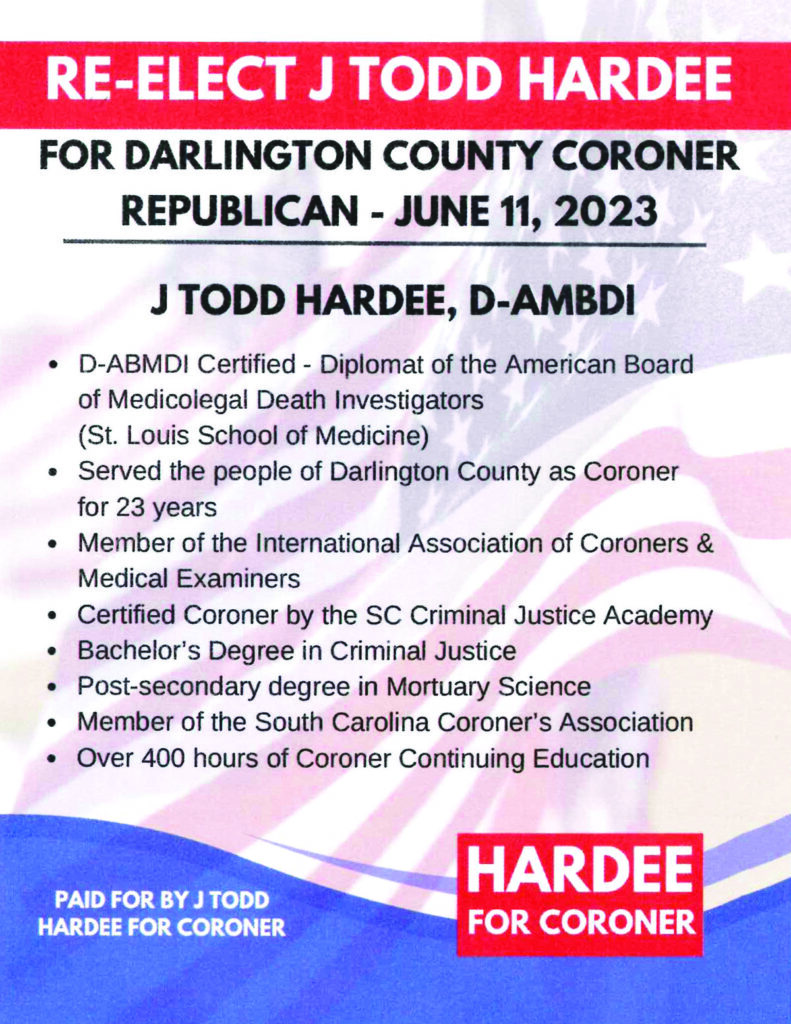Chamber meeting says bad roads hinder SC business

By Samantha Lyles, Staff Writer, slyles@newsandpress.net
Crumbling roads and bridges are a big obstacle on the path to prosperity, according to state politicians and business executives who spoke at the October 15 Pee Dee Grassroots Meeting held at the Darlington Raceway.
Staged by the South Carolina Chamber in conjunction with Pee Dee area chambers of commerce and presented by Embrace Hospice, the meeting offered some straight talk about the poor condition of SC highways and their negative effect on business and industry.
“The South Carolina road system is the fourth largest state-maintained system in the United States,” said Jay Lucas, Speaker for the SC House of Representatives, noting that our state’s 42,000 road miles were further compromised by the recent rain and floods.
“I believe that we now have between 55 and 60 percent of our state roads that are in poor condition. That includes our Interstates, our US Highways, our primary state routes. That’s a mind-boggling figure,” said Lucas.
Lucas said that about 50 percent of state-maintained roads carry very little traffic – about 7 percent – and many are less than a mile long. As a result, there are two de facto road systems: these smaller roads and the larger ones that carry 93 percent of SC road traffic. Lucas said state legislators must make the difficult decision to channel repair efforts toward those roads that see the most traffic and bring the state the most benefit.
“That’s what we need to concentrate on in South Carolina, that 93 percent,” said Lucas. “We’ve got to fix the Interstates, we’ve got to fix the roads that people travel on.”
Progress on improving state roads has been hampered by funding disagreements, and since the House can’t seem to get the Senate on board with a highway bill that increases the fuel tax – which is a user fee, paid only by those who buy fuel and use our road system – road repair bills have been footed by general fund dollars.
“And who pays into the general fund? You all, South Carolinians,” said Lucas. He said that in his 17 years in the House, he has only voted to increase taxes twice: on cigarettes to pay for resulting health care costs, and now on fuel to pay for road repairs.
Lucas said that unless something is done very soon, South Carolina might lose whatever traction the state has gained in recent years with economic development. He cited a statement from Pete Selleck, chairman and president of Michelin North America, saying that his company would not locate another plant or expand business in South Carolina until the state fixes its roads.
Lending credence to that concern, Roger Schrum, Sonoco vice president of Investor Relations and Corporate Affairs, said rerouting his company’s trucks around impassable and poor roads is taking a toll on Sonoco’s transport budget and putting them at a disadvantage versus their competition.
“We’ve found that through increased maintenance costs and travel – having to divert certain bridges and roads that were impassable by our trucks – that we are having to increase our costs on an annual basis by about $5 million to $6 million,” said Schrum.
He added that other SC industries, like the Honda plant in Timmonsville, that rely heavily on road transportation are also bearing extra costs. Schrum said that while a fuel tax increase might pinch budgets initially, the lasting benefit of better roads would be worth it.
“Believe me, we’ll get savings out of that over the long run,” said Schrum.
While roads are the number one issue on the South Carolina Chamber’s legislative agenda, education is a close second. John Uprichard, SC Chamber board chair, cited the need to improve the jobs pipeline and prepare workers for critical needs jobs – which require more education than a high school diploma but less than a four-year degree.
Critical needs jobs account for 45 percent of the workforce, yet only 29 percent of South Carolinians have the skills necessary to fill those jobs. Uprichard voiced support for Gov. Nikki Haley’s workforce development program, SucceedSC, which would have provided underemployed and undereducated adult workers with grant-funded training and accreditation for critical needs jobs. SucceedSC failed to pass the general assembly in 2015.
On a positive note, Darlington Raceway president Chip Wile said the 2015 Labor Day race weekend surpassed all expectations, with the Bojangles Southern 500 and VFW Sport Clips Help a Hero 200 races drawing big crowds and garnering positive attention for the track.
“Darlington Raceway is back,” said Wile. “This was the largest event attendance-wise we’ve had out here in ten years… and the economic impact of our event over one weekend is north of $60 million, dumped right into the Pee Dee and the Grand Strand.”
Wile said a new economic impact study is planned for the 2016 Labor Day weekend races, and he feels that $60 million figure could climb even higher. He also said the Raceway will continue to host community events, like the July 4 Freedom Fest concert and fireworks festival that brought 32,000 people to the track, and the Nov. 13 Speed and Feed Barbecue Cook-Off and Car Show.
“From a fan perspective and from a community perspective, I feel like we’ve made a lot of strides in the last eighteen months, but we still have a lot of work to do,” said Wile.






